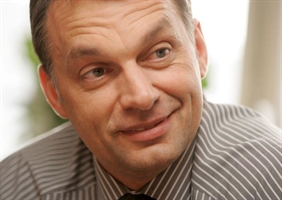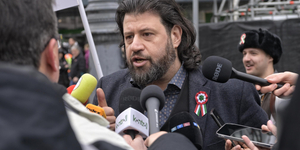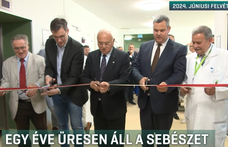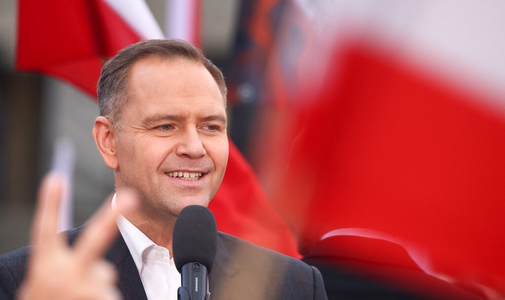 © Túry Gergely |
Let us assume that Fidesz wins the elections and that a new government takes office in May or June. What do you plan in your first six months, apart from establishing a HUF500bn job creation fund and, as part of the new Széchenyi Plan, a HUF1000bn fund to better capitalise small and medium-sized enterprises? First, let me point out what the experts all know, even if not all of them admit it: Hungary's economy is moving in an unsustainable direction. Neither the current level of our twin deficits nor the speed of public debt growth can be sustained. If a Fidesz government is formed, we will have to act immediately. We will immediately shave 10 per cent off social insurance contributions. We will also have to act on the budget. We will work out exactly what the budgetary situation is. In recent years, budget discipline has become so lax and political statements on the budget have caused so much damage, that even those manipulating the numbers no longer no the true figures. We will establish a consulting body composed of Hungarian experts living abroad who will examine the budget from top to bottom and work out the true figures.
And what if this body, having established the true figures, finds them to be larger than anyone expected? If this happens we have to inform the public of the true numbers and ask for national unity to overcome the problems. In all honesty, I hope that the situation is not quite so catastrophic.
All parties are trying to avoid talking about making enormous savings, but there has been plenty of talk about "adjustment". Is a Fidesz government going to announce a new Bokros package? There will be little time for the correction. We think the economy can grow its way out of the crisis, so long as we can raise the current 4 per cent level of growth with precise, well-directed measures. Growth levels look good compared to the EU, but it is a poor performance compared to that of the other new member states. It is important to make changes that will promote entrepreneurialism, create jobs - that is to say, speed up growth. If we see the first fruits of this in six months or a year, then we can still hope to restore balance swiftly without resorting to measures that will drastically affect quality of life. The key point is to hand Brussels a plan for consolidating our budget in September, a plan for convergence leading to the euro, and for Brussels to be persuaded by this. This will not be easy, since little confidence remains in Hungarian statistics after the "tricks" of the past four years.
You announced two initiatives in your speech to the Hungarian Chamber of Commerce and Industry. A new budgetary council, composed of respected experts, would share responsibility for budgetary discipline with parliament, with the aim of dissuading the government from even thinking about overstepping the budget guidelines. You made an even more striking proposal that would serve the same end: the prime minister and the other ministers would have to take personal responsibility for sticking to the budget. If they do not succeed, they will see their pay docked. Did this idea come from János Kornai, who made a similar proposal even before the 1989 regime change?
I do not deny it. Kornai's proposal did influence me, but there are similar examples in other countries, throughout Europe. In Portugal, for example, not only ministers, but also senior civil servants forfeit some of their salary if budget targets are missed. We want to bring an end to the current opaque system of cross-financing public services like education and health. Nobody knows, for example, how much is spent on these areas, what is cheap and what is not. It is true that a two-thirds majority would be needed in parliament to achieve this. We will propose a new public procurement law in September that will make public procurement as transparent as procedures at domestic and foreign companies. We will change the law on commerce, giving guarantees to vendors, who are currently entirely at the mercy of suppliers. As far as the serious problem of debt roll-over is concerned, the government will begin to balance public debt. It will start by setting an example: it will pay vendors straight away, without waiting for the 30-day deadline. We will drastically cut away at the administrative burdens that are crippling companies. The time and the money they spend on administration will halve. We will make part-time employment and teleworking more straightforward. We will introduce dual professional education based on professional schools and work placements.
You also told the Chamber that the previous government's market-opening official trips abroad had achieved little. You suggested that, in future, it should not be businessmen accompanying state delegations, but the other way round: business delegations should invite ministers, or even the prime minister, to accompany them. You called for an business- and market-focused foreign policy. What would an Orbán government's foreign policy look like? I'd like to address this more broadly. Security is the most important thing for us. Only America can guarantee this. For this reason, we must strive for the best possible relations with the US. We can see that a certain anti-Americanism has developed in Europe, especially among intellectuals. We can find traces of this even here in Hungary. But we must not bury our heads in the sand. Europe does not have a common security policy. Without American intervention war might still be raging on our southern borders, endangering the Hungarians living on the far side of those borders, as well as those of other nationalities. Of course, as an EU member state, we are closely linked to Europe. We are good allies, but we defend our own interests. Europe must not expect us to play a bridging role between Europe and Russia: we are more of a bridgehead, whether in terms of energy policy, energy supply or the foreign-policy aspects of democracy.
As far as the Carpathia Basin region is concerned, we all speak a common language. We form an emotional community, a natural unity, which may bring economic benefits as well. We see strength and energy in the Hungarians living in neighbouring countries, not a problem. Though some companies, like Mol and OTP, have ventured across the border, Hungarian "multinationals" have thus far only been dipping a toe in the water. We should follow Austria: nowadays, they receive as much investment from abroad as they invest in other countries. Much of this money is going to precisely those countries - our neighbours - where Hungarian companies shuld be investing.
You often talk of a "patriotic economic policy," and of "Hungarian solidarity." Does this not conflict with globalising trends, with the notion of capital, labour and expertise flowing freely, ignoring national frontiers?
You can take an emotional approach to globalisation. You can like it or dislike it - but it still exists, and so you have to deal with it. Attacking it is bad politics. You have to make the best of it, as I suggested earlier. But it is not absolutely necessary for us to be the mugs of Europe. The star pupils of globalisation, the US, France and Germany, are doing very well out of globalisation's freedoms. But they are still very careful not to subordinate national strategic interest to a vague philosophical belief in the free market. We are doing the same, and nobody should criticise us for it.
There are uncertain voters of liberal persuasion who think back with nostalgia to the Viktor Orbán of 15 to 20 years ago, when they stood on the same side as you, united in opposition to the Communist system, and sharing a common desire for the challenges of democracy. Now they look on sadly, seeing that the word "liberal" features almost as an obscenity in the right-wing lexicon. Just take a look at the daily Magyar Nemzet or the weekly Új Demokrata . Why is Fidesz not trying to attract these people? You are talking about people who reject radicalism, people who think rationally and reject state tutelage. They are people who were angered by the Free Democrats' decision to ally with the Horn government. We want to address them. But do not forget that Fidesz is a multicoloured alliance, similar to the broad-church parties of the West that gather in many different viewpoints. This is very valuable: many opinions sit alongside each other, since the holders of those opinions have come together to work for a common goal. But the compass needle must point towards the centre. I would like to see growing numbers of liberals finding a home inside this party. We should have our arguments within the camp, always respecting the views of people we disagree with.
People have concerns about you. When you were prime minister, you made parliament meet less frequently, leading many to think that you wanted to avoid being held to account. Even the people who say this most loudly cannot really believe it, since they remember the days when they opposed us, defending the People's Republic, the one-party system and the presence of Soviet troops. Let us be clear about one thing: back then, we were the ones fighting for freedom of speech and opinion, the right to free assembly - for democracy, in fact. The secret service monitored us, they eavesdropped on us. The police harassed us and arrested us. We were democrats when it did not pay to be a democrat. It is disagreeable to take lessons in democracy and republicanism from people who defended the party state 18 years ago.
The parliament is an important tool of democracy, but just one of many such tools. You cannot contain democracy inside parliament, making it the private affair of 400 people. Look at France, where politicians have consulted the people outside parliament on many matters of importance. Travelling around the country, I increasingly realise how alienated people are from politics. What we fought for in the 1980s, the democratic ideal, now seems very distant. That is why we have tried to reintroduce direct representation of the people, with initiatives like the National Consultation and the country-building meetings. Now even the Socialists have realised that democracy is more than just parliamentary debates, a few referendums and parliamentary elections every four years. Now they too are calling their supporters onto the streets - which I take some satisfaction in seeing. If we form the next government, we will continue the national consultations, but we hope also that the parliament will become a forum for great, serious, expansive debates, allowing us to broaden democracy out. I take the institutions of democracy seriously, but I take people seriously as well. That is what I work for.

















